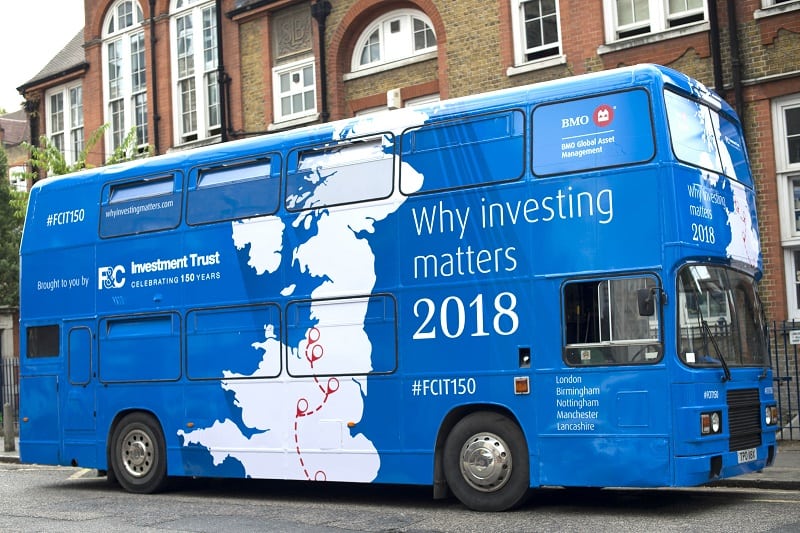Investment trusts have traditionally been sidelined for more lucrative open-ended products in asset management marketing budgets but shifts in the shareholder base is reversing that trend.
“The industry can be quite myopic and look at it as lost money,” says Baillie Gifford director for marketing and distribution James Budden about ploughing resources into peddling closed-ended vehicles. Asset managers believe promoting closed-ended funds won’t drive up assets under management (AUM), Budden says.
But Baillie Gifford actively courts retail investors for discount control, to improve liquidity and to ultimately issue more shares, he says.
Eight out of nine investment trusts at the Scottish asset manager trade at a premium, with the UK Growth mandate taken over from Schroders just over a month ago being the only product with a discount, trading at 4.9%. Its highest premium is 6.7% on the £536m Shin Nippon investment trust.
Association of Investment Companies (AIC) communications director Annabel Brodie-Smith concedes large open-ended ranges can dominate resources because “every pound in is an extra pound under management”.
“Having said that investment trust boards are increasingly aware of marketing,” she says. “In the past, perhaps investment companies have been seen as not marketing themselves as aggressively as open-ended funds as part of trying to keep their costs down. The views on that have changed and it’s accepted investment companies now need to market their shares.”
F&C Investment Trust anniversary reaps returns
In July, Foreign & Colonial Investment Trust (F&C IT) stated in its half-yearly results that marketing efforts surrounding its 150th anniversary (pictured) had helped push its shares into premium territory. The board opened the London Stock Exchange on the anniversary on 19 March, while the company has also engaged in a financial education campaign with school children and presented a series of lectures with guest speakers.
F&C IT chairman Simon Fraser told Portfolio Adviser they have focused on a younger audience and financial education as part of their anniversary campaign. That will position the trust appropriately for the future, Fraser says.
The anniversary has been well exploited, said Winterflood Investment Trusts in a research note that followed the interim results. It expected momentum to continue such that the £4.3bn investment trust would be able to issue new shares at a premium.
The 0.1% premium championed in the interim results for the period ended 30 June had risen to 0.9% just over a month later on 6 August, according to AIC data.
BMO GAM, investment manager for the trust, did not provide details of its marketing budget for its anniversary year.
Investment trust share registers shift
The natural buyers of investment trusts have shifted from pension funds and institutional investors to wealth managers and now to retail investors, according to Miton chief executive David Barron, who used to head up the boutique manager’s investment trust range before his promotion in 2017.
“They’re becoming the marginal buyer so your marketing has to evolve, particularly for equity investment trusts.”
Marketing can have a real impact on discounts, says Barron, pointing to their investment trust of investment trusts, currently trading at a 1.4% discount, as an example.
“Miton Global Opportunities three years ago was trading on a circa 10% discount and the board took steps to put in place a new capital structure, whereby investors could get out at net asset value. At the same time, more effort was put into the marketing, particularly in the consumer channels.
“And, hey presto, there’s been good performance with significant buying through the platforms and the discount has come in.”
Discounts and liquidity drive change
Baillie Gifford views investment trusts as a vehicle for “pseudo inflows”, Budden says. That contrasts with the conventional view in asset management that inflows should be sought via Oeics and unit trusts.
“We do invest a lot in marketing in conjunction with the trusts we manage. The idea being that we have an aim to have them trade at a premium so that they can then issue shares and create that liquidity.
“At the same time that grows the size of the trust and reduces costs for shareholders.”
The asset manager has issued over £400m worth of new shares via its investment trust range this year. “That’s a pretty significant slice of new equity,” he says.
Marketing expertise on boards
“Direct-to-consumer marketing is something the more sophisticated and switched on investment trust boards are very mindful of,” says Simon Elliott head of research at Winterflood Investment Trusts.
“To have expertise on the board is, if not essential, very important and increasingly important.”
Brodie-Smith says that has been noticed at the AIC too.
“If you look at the skills that investment company boards are looking at for directors, they’re increasingly looking for marketing and distribution, so looking at things like platforms,” she says. “Clearly generating demand is something investment company boards do and generating demand is a way of controlling discounts.”
But Barron says while the board needs access to marketing expertise, individual directors don’t necessarily need that background.
Either the board or the asset manager can be responsible for marketing activity, says Budden. Baillie Gifford works in partnership with boards over marketing budgets, he says.
“Asset managers will normally come up with marketing plans and suggest the trust invests a certain amount to get those plans off the ground.”










